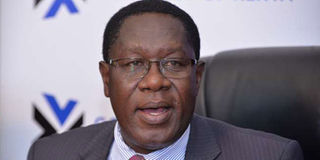Cord should listen to reason on elections

Communications Authority of Kenya Director-General Francis Wangusi speaks at a press briefing on June 30, 2016. The country has a vast 3G network coverage. PHOTO | SALATON NJAU | NATION MEDIA GROUP
What you need to know:
- The authority confirms that 2,454 sub-locations have 100 per cent coverage.
- Satellite can help cover existing connectivity gaps, but it would require provision of redundancy in case of system failure.
Going by the Communication Authority of Kenya’s statistics, the 3G coverage and network covers 78 per cent of the Kenyan populace.
The geographic coverage, meanwhile, is 17 per cent.
The authority confirms that 2,454 sub-locations have 100 per cent coverage; 1,324 sub-locations have up to 90 per cent coverage and 2,123 have 0-50 per cent while 1,244 sub-locations have no coverage at all.
Right across the country, 896 secondary schools can facilitate connectivity.
Satellite can help cover existing connectivity gaps, but it would require provision of redundancy in case of system failure.
Clearly, apart from the BVR voter identification, the Independent Electoral and Boundaries Commission will not be able to transmit electronically from 1,244 sub-locations in the country.
Assuming that every sub-location has five polling stations, this means that between 5,000 and 6,000 polling stations cannot transmit results electronically, purely because of the technical truth that they have no 3G coverage.
This is a critical matter and has nothing to do with whether Cord or Jubilee Party likes it or not.
BEST ALTERNATIVE
Demanding that a back-up voter register that mirrors the electronic voter register be done away with is being impractical and unreasonable.
It is akin to insisting on travelling to a village in a fixed-wing plane where an airstrip does not exist and going further to insist that a chopper should not be used instead.
The IEBC has these facts. So does the Communication Authority and the public.
But these bodies have been so terrified by street protests and being labelled as favouring Jubilee that they have basically gone mum.
The discourse we should be having now should be how we can ensure that the hard copy voter roll is administered in such a way that it doesn’t undermine the integrity of the electoral process.
Such a fallback manual register for every polling station should be printed only by the firm printing the ballot papers themselves and sealed.
We certainly do not wish to go back to the era of the discredited black book.
A security printed voter roll as a fallback position is best practice around the world.
But Cord, and in particular the ODM wing, have appeared not to be ready to engage in any reasonable discourse on this matter.
Their response is the predictable threat of ‘mass action’.
Kenyans are supposed to be intimidated into submission and accept what ODM and Raila Odinga want if we are to buy some peace in the new year.
So we have heard of the eight-day ultimatums and threats on Kenyans who are generally peace loving and extremely and rightfully scared of a repeat of the post-election violence of 2008.
STREET DEMOS
In 2007, Raila disputed Mwai Kibaki's re-election and the country descended into the post-election crisis.
In 2013, Raila, yet again, disputed the result, but this time in the Supreme Court. Again, he was adjudged the loser.
For 2017, Raila wants a contest run entirely on BVR technology and with no back-up/fallback whatsoever, even if there is a power failure.
He wants only electronic transmission of the results. If there is no network or there is a network failure, then hard luck.
The IEBC must comply otherwise they will have bungled the elections.
If they try to put any measures in place in advance to ensure that they have a fallback, then they must be ready to face street demonstrations on the streets.
And the last time Cord were in the streets, all IEBC commissioners were chucked out. The new commissioners better beware.
All in all, Kenyans have to decide at what point they would rather face up to this intimidation with minimum damage to the country.
Do we face it in January and February complete with street demonstrations or do we face it in the second week of August 2017?
Because facing it we must, given the history and political styles of the players.
Raphael Tuju is head of the Jubilee Party secretariat and a former Cabinet minister





